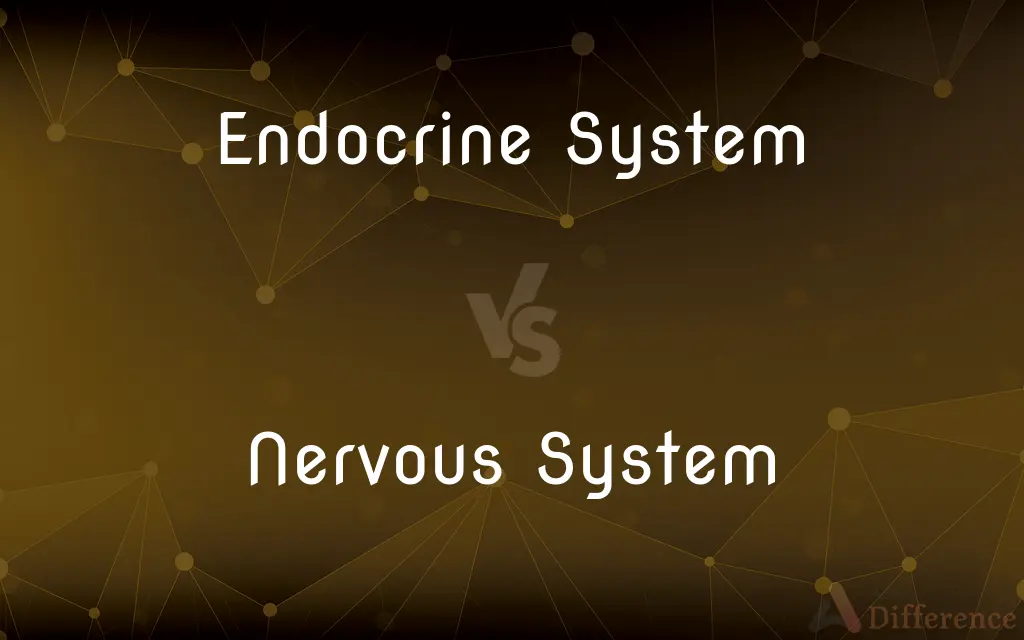Endocrine System vs. Nervous System — What's the Difference?
By Tayyaba Rehman — Published on December 16, 2023
The Endocrine System regulates body functions through hormones, while the Nervous System uses electrical impulses for rapid communication and response.

Difference Between Endocrine System and Nervous System
Table of Contents
ADVERTISEMENT
Key Differences
While the Endocrine System employs chemical messengers known as hormones to transmit signals over longer durations, the Nervous System uses electrical and chemical signals for instant and short-term responses.
The Endocrine System generally controls processes that are broad and sustained, such as growth, metabolism, and reproduction. The Nervous System, on the other hand, manages rapid reactions like reflexes and instantaneous sensory responses.
Hormonal signals in the Endocrine System can have effects that last from a few hours to several days. However, signals in the Nervous System often have immediate, short-lived impacts, subsiding once the stimulus is removed.
While both systems are crucial for maintaining homeostasis in the body, the Endocrine System tends to have a more delayed, but longer-lasting effect, whereas the Nervous System ensures swift, acute reactions to stimuli.
Comparison Chart
Primary Function
Produces and secretes hormones
Processes and transmits information
ADVERTISEMENT
Signal Transmission
Hormonal (chemical)
Electrical and chemical
Duration of Effect
Long-lasting
Immediate and short-lived
Components
Glands, hormones
Brain, spinal cord, nerves
Typical Responses
Growth, metabolism, reproduction
Sensory perception, reflexes, motor control
Compare with Definitions
Endocrine System
The Endocrine System oversees prolonged bodily processes via hormonal communication.
Puberty is a significant stage in life governed by the Endocrine System.
Nervous System
The Nervous System is an intricate network responsible for transmitting information throughout the body.
When you touch a hot surface, it's your Nervous System that makes you pull away swiftly.
Endocrine System
The Endocrine System operates by dispatching chemical signals across the body.
Growth hormones released by the Endocrine System promote cell growth and repair.
Nervous System
Through electrical signals, the Nervous System facilitates instantaneous communication.
The sensation of pain is immediately communicated to the brain via the Nervous System.
Endocrine System
The Endocrine System influences almost every cell, organ, and function of our bodies.
The Endocrine System's adrenal glands release cortisol, a hormone involved in the stress response.
Nervous System
Comprising the brain, spinal cord, and nerves, the Nervous System governs both voluntary and involuntary actions.
Breathing, controlled by the Nervous System, occurs without conscious thought.
Nervous System
The Nervous System functions as the body's control center and communication highway.
The Nervous System enables you to interpret and respond to sensory information like sight and smell.
Nervous System
The Nervous System ensures rapid response to external and internal stimuli.
Upon hearing a loud noise, the Nervous System prompts your heart rate to increase.
Common Curiosities
Which system has a more prolonged effect, Endocrine or Nervous?
The Endocrine System generally has longer-lasting effects.
Are the brain and spinal cord part of the Endocrine System?
No, they are components of the Nervous System.
How does the Nervous System transmit information?
Through electrical and chemical signals.
Which system is responsible for reflex actions?
The Nervous System.
Can the Endocrine System affect mood and behavior?
Yes, hormonal imbalances can influence mood and behavior.
What's the primary function of the Endocrine System?
It produces and secretes hormones to regulate body functions.
Which gland is considered the master gland in the Endocrine System?
The pituitary gland.
What role does the Nervous System play in pain perception?
It transmits pain signals from the affected area to the brain.
How does the Nervous System relate to the senses like vision and hearing?
It processes sensory information, allowing us to see, hear, etc.
How fast does the Nervous System respond to stimuli?
Almost instantaneously.
Which system uses hormones as chemical messengers?
The Endocrine System.
How does the Endocrine System maintain homeostasis?
By releasing hormones that regulate vital functions like temperature and glucose levels.
How is the Nervous System protected?
By the skull, vertebral column, and meninges.
Do the Endocrine System and Nervous System work independently?
No, they often work in tandem to ensure the body's proper functioning.
Can disorders of the Endocrine System affect the Nervous System?
Yes, as hormones play a role in various neural processes.
Share Your Discovery

Previous Comparison
Monocistronic mRNA vs. Polycistronic mRNA
Next Comparison
Nail Polish Thinner vs. RemoverAuthor Spotlight
Written by
Tayyaba RehmanTayyaba Rehman is a distinguished writer, currently serving as a primary contributor to askdifference.com. As a researcher in semantics and etymology, Tayyaba's passion for the complexity of languages and their distinctions has found a perfect home on the platform. Tayyaba delves into the intricacies of language, distinguishing between commonly confused words and phrases, thereby providing clarity for readers worldwide.













































